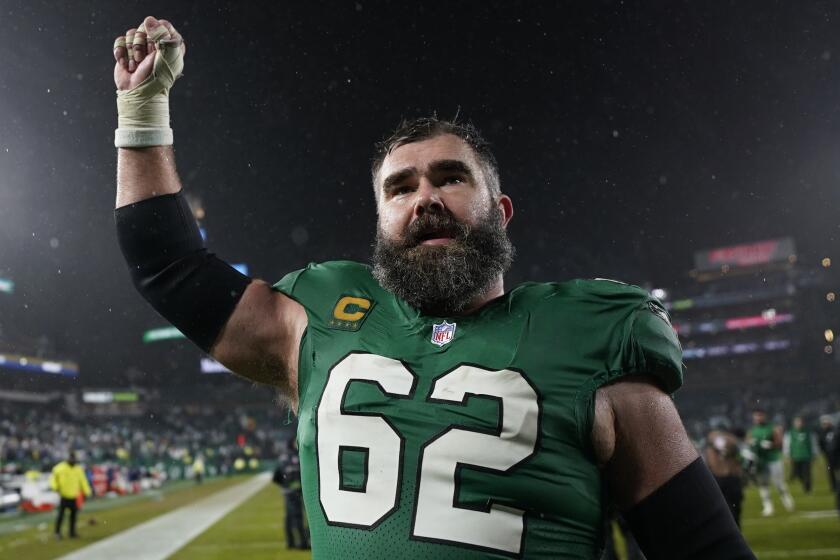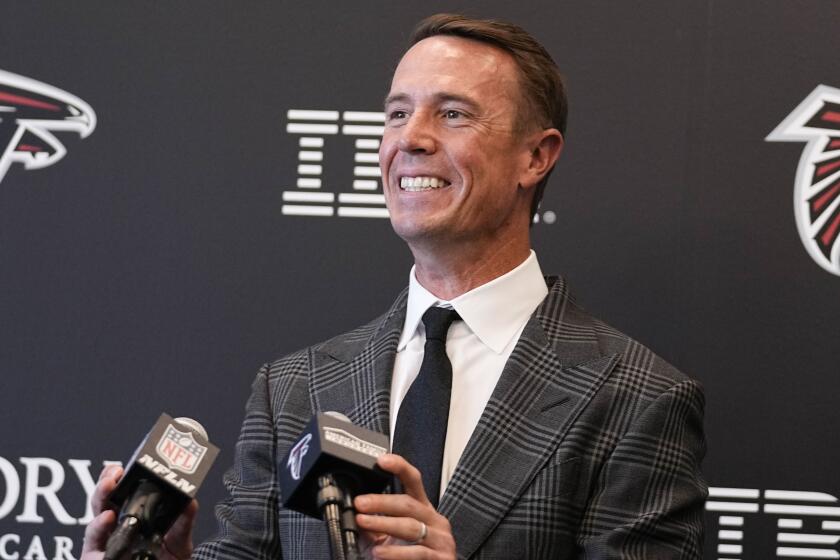Medium sends message in ‘1968’
Having done his bit to define and honor “the Greatest Generation,” it is not surprising that Tom Brokaw has followed it up with a book about the Sixties and, of course, the requisite television special.
“1968 With Tom Brokaw,” which debuts Sunday on the History Channel, purports to analyze one of the most tragic and turbulent years in recent history. The Tet Offensive, the student protests, the assassinations of Martin Luther King Jr. and Robert F. Kennedy, the nascent drug culture, the rise of feminism -- in many ways, 1968 shook this country so hard the aftershocks continue to register today.
Though there is nothing new revealed in “1968” -- the baby boomers have been chronicled within an inch of their collective lives -- it is an alarming and effective trip through a year in which conflict and tragedy occurred with the regularity of some ghastly drumbeat. We also see the impact events such as the Kennedy assassination and the war protests continue to have on our current conditions.
But even more vivid than the message of “1968” is the medium. Television came of age right along with the boomers, hitting its stride during the Vietnam War. The bloody conflicts, the endless dead poured into the living rooms of America, and with them the demonstrations, the prevaricating politicians and the insurgent entertainers, such as folk singer Arlo Guthrie or the Smothers Brothers, playing satirical hide and seek with the network censors. Student protesters may have nudged Americans to a weariness with the war, but it was Walter Cronkite who ended it. Broadcasting live amid the rubble, he declared it unwinnable, at which point President Lyndon B. Johnson conceded that if he had lost Cronkite, he had lost Middle America.
Right up close, of course, was the young Brokaw, an almost laughable figure at times, standing in his severe suit on the corner of Haight and Ashbury streets, reporting on the counterculture, the hippies and Yippies and radicals or reciting the day’s progress in Vietnam.
At times he overreaches. The poignancy of the story of a friend lost in battle -- gravely intoned as only Brokaw can gravely intone -- is undercut by what seems an attempt to achieve Forrest Gump status. Brokaw himself wasn’t in battle, but his very good friend was.
Yet there is no denying that Brokaw understands the power of television. Of the four newscasters who inherited Cronkite’s mantle of influence and eminence -- David Brinkley, Dan Rather, Peter Jennings and himself -- Brokaw has clearly emerged as MVP, using his role as “witness to history” to create a new subset of scholarship: the history of the televised world.
This is neither a small nor insignificant branch of cultural academe. “1968,” and indeed the entire life span of the baby boomers, is easy to chronicle precisely because so much of it was televised. The country was polarized over many things and emotions ran high partly because television made the issues newly personal. Here was Martin Luther King Jr., in close-up, speaking directly to you. Here are women protesting the Miss America pageant, right in your face.
Americans did not have to rely on a few photos in a newspaper or the blind accounts of radio to understand the impact of the riots at the Chicago Democratic Convention or the horrific senselessness of the Kennedy shooting -- they could see it for themselves. The nature of history itself was changed -- suddenly it was live and in color.
So the two hours of “1968” fly by, fueled by an endless supply of startling film clips, from a classic Smothers Brothers skit to Richard Nixon and his impossibly strange double victory sign. Here are all the young Eugene McCarthy supporters believing they can change the world, here are the draft-dodgers and the vets, Brokaw telling us about waiting in L.A. to hear if Kennedy was still alive and talking with Rafer Johnson, the Olympic gold medalist who wrestled the gun from Sirhan Sirhan.
Knitting it together is an assortment of “survivors” who filter the year through their own experiences and politics. Tommy Smothers, Jon Stewart, Arlo Guthrie, Robin Morgan and, oddly, Bruce Springsteen represent the Left, celebrating the various assaults on the establishment, while Pat Buchanan and Dorothy Rabinowitz call the boomers spoiled and narcissistic, arguing that they repelled many more than they attracted.
Contrasting real people from opposing sides at the time -- a former Chicago police officer and a participant in the demonstrations outside the Democratic convention, for example -- Brokaw makes a wonderfully illuminating point about the subjectiveness of history, not to mention the power of nostalgia. The police officer claims the protesters were armed, the protester denies it and 40 years later, the conversation is instantly heated.
Undoubtedly, the most powerful thread of “1968” involves the murders of King and Kennedy. For a nation still reeling from the 1963 assassination of President John F. Kennedy, these two events alone seemed to herald an apocalypse. Even Rabinowitz, scathing in her comments about the baby boomers, concedes the irreparable damage done to a generation by the killings.
While the deaths are often used as milestones from the boomers, “1968” clearly shows the immediate impact on the American political topography. The civil-rights movement erupted in rage and riot after King’s death, never to quite regain its steady step of progress, while McCarthy lost heart, and the nomination to nonstarter Hubert Humphrey, resulting in the Nixon administration and a Democratic Party in disarray.
The year and the documentary ends with the first moon launch, attempting to offer hope as a coda. The lunar images are amazing, startling and, we are told, the nation was briefly united in wonder at human achievement. Again, it is television that provides, and records, this unity, television that was still an amazement in itself, television in all its own youth and glory, when people like Cronkite and Brokaw were still considered leaders, imbued with wisdom and insight.
Much is made during “1968” of the role TV played in Vietnam. It is ironic that now, with hundreds of channels steaming information 24 hours a day, our TV coverage of the war in Iraq is spotty at best. We are also as politically passive, and impassive, a nation as we have been in decades. If nothing else, “1968” evokes the danger and vitality of a politicized populace and reminds us that individual action can have consequence, that a single year can change the course of history.
--
‘1968 With Tom Brokaw’
Where: The History Channel
When: 9 to 11 p.m. Sunday
Rating: TV-PG (may be unsuitable for young children)
The complete guide to home viewing
Get Screen Gab for everything about the TV shows and streaming movies everyone’s talking about.
You may occasionally receive promotional content from the Los Angeles Times.




